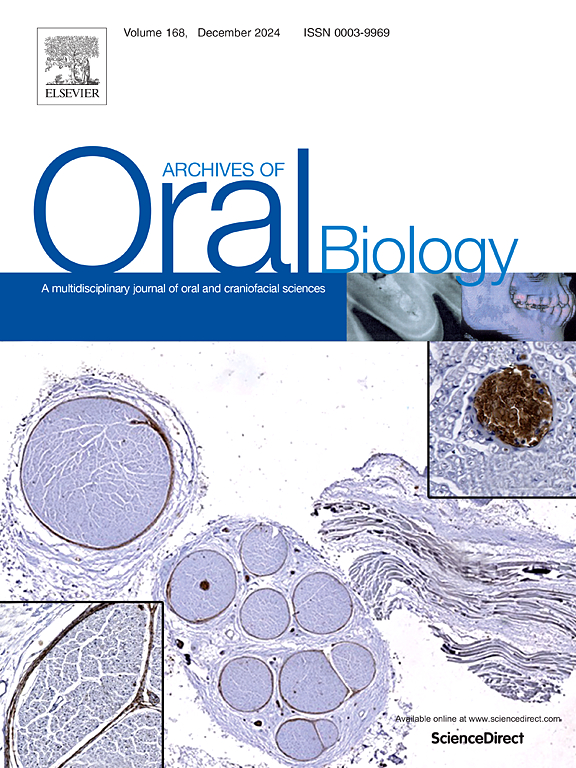Akkermansia muciniphila enhances mucosal immunity against porphyromonas gingivalis
IF 2.2
4区 医学
Q2 DENTISTRY, ORAL SURGERY & MEDICINE
引用次数: 0
Abstract
Objective
This study aims to investigate the immunomodulatory potential of Akkermansia muciniphila in restoring Porphyromonas gingivalis-induced immune dysfunction.
Design
The immune response was assessed by measuring the expression of pro-inflammatory cytokines and antibacterial peptides in human gingival epithelial cells and human gingival fibroblasts treated with A. muciniphila, P. gingivalis, or a combination of both. Activation of the NF-κB pathway was analyzed using immunofluorescent staining and western blot. In vivo validation was performed using a mouse model, where A. muciniphila and P. gingivalis were administered alongside a MyD88-specific inhibitor to confirm the immunomodulatory mechanisms.
Results
A. muciniphila significantly enhanced the defensive immune response through TLR-MYD88-NF-κB pathway. In vitro and in vivo, A. muciniphila upregulated chemokine expression to recruit immune cells. A. muciniphila also reduced the adhesion and internalization of P. gingivalis and increased the expression of genes encoding antimicrobial peptides (DEFB103B and CAMP).
Conclusions
A. muciniphila demonstrates potential in combating P. gingivalis infection highlighting its role as a promising immune modulator for periodontal disease management.
嗜粘杆菌增强牙龈卟啉单胞菌的黏膜免疫
目的探讨嗜粘杆菌在修复牙龈卟啉单胞菌引起的免疫功能障碍中的免疫调节作用。免疫反应通过测定促炎细胞因子和抗菌肽在人牙龈上皮细胞和人牙龈成纤维细胞中的表达来评估,这些细胞分别用嗜粘杆菌、牙龈假单胞菌或两者联合处理。采用免疫荧光染色和western blot分析NF-κB通路的活化情况。通过小鼠模型进行体内验证,在小鼠模型中,嗜黏液芽胞杆菌和牙龈芽胞杆菌与myd88特异性抑制剂一起施用,以确认免疫调节机制。嗜muciniphila通过TLR-MYD88-NF-κB通路显著增强防御性免疫应答。在体外和体内,嗜粘杆菌上调趋化因子表达以募集免疫细胞。嗜粘杆菌还能降低牙龈假单胞菌的粘附和内化,增加抗菌肽编码基因(DEFB103B和CAMP)的表达。嗜muciniphila在对抗牙龈假单胞菌感染方面显示出潜力,突出了它作为一种有前途的牙周病管理免疫调节剂的作用。
本文章由计算机程序翻译,如有差异,请以英文原文为准。
求助全文
约1分钟内获得全文
求助全文
来源期刊

Archives of oral biology
医学-牙科与口腔外科
CiteScore
5.10
自引率
3.30%
发文量
177
审稿时长
26 days
期刊介绍:
Archives of Oral Biology is an international journal which aims to publish papers of the highest scientific quality in the oral and craniofacial sciences. The journal is particularly interested in research which advances knowledge in the mechanisms of craniofacial development and disease, including:
Cell and molecular biology
Molecular genetics
Immunology
Pathogenesis
Cellular microbiology
Embryology
Syndromology
Forensic dentistry
 求助内容:
求助内容: 应助结果提醒方式:
应助结果提醒方式:


